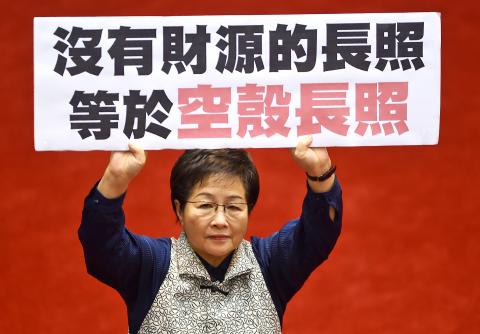The legislature yesterday passed a draft bill on long-term care services, clearing the way for the Chinese Nationalist Party’s (KMT) proposals over the funding of long-term care to be written into law.
After eight cross-caucus negotiation sessions and a multitude of debates involving the KMT, the Democratic Progressive Party (DPP) and civic groups, the bill finally passed after a controversial clause on the source of funding for the care services was put to a floor vote — considered a last resort for the passage of a bill.
The KMT-authored bill stipulates that funding should come from public coffers, health surcharges on tobacco, donations, interest from the fund and other sources, while the DPP called for an increase of inheritance and gift taxes.

Photo: Liu Hsin-de, Taipei Times
“The legislation is progressive as it guarantees universal, plural and affordable services and the dignity and rights of both care-receivers and caregivers. Discrimination, whether it is based on gender, sexual orientation, class, race or religion, has also been clearly prohibited,” Democratic Progressive Party (DPP) Legislator Yu Mei-nu (尤美女) said. “However, it is regrettable that this progressive act lacks the funding to be extensively and substantively enforced. The clause on funding voted for by the KMT caucus allows for NT$12 billion (US$392 million) in government funding over five years, which is only NT$2.4 billion per year. How plural, universal and affordable could these services be?”
DPP Legislator Lin Shu-fen (林淑芬) criticized the passage of the bill, saying that without proper funding the legislation would be “a continuation of what used to be called the ‘residual welfare model.’”
“It shows that the government does not want to establish a public and universal system of care services, but instead, with the long-term care service insurance act soon to be passed, give out financial subsidies to those needing services, which would surely commercialize and stratify the system, with most people denied high-quality and affordable services,” Lin said.
The KMT viewed the passage more positively.
“There are close to about 800,000 disabled people [who need these services] in the nation, which means that the passage would benefit more than 2 million people, [including those who need the services and their families],” Minister of Health and Welfare Chiang Been-huang (蔣丙煌) said.
The legislation provides a legal framework for the integration of various types of long-term care services.
Personnel management and training; management of institutions; protection of the rights of the care-receivers and encouraging and rewarding measures for the development of services, are the four major pillars of the act and will enhance the quality of the nations long-term care services, Chinese Nationalist Party (KMT) Legislator Alicia Wang (王育敏) said.
The act also allows for employed, personal and family caregivers to be systematically incorporated into the long-term care systen framework, with the former group, including migrant caregivers, provided with training and the latter with respite care services, she said.

The manufacture of the remaining 28 M1A2T Abrams tanks Taiwan purchased from the US has recently been completed, and they are expected to be delivered within the next one to two months, a source said yesterday. The Ministry of National Defense is arranging cargo ships to transport the tanks to Taiwan as soon as possible, said the source, who is familiar with the matter. The estimated arrival time ranges from late this month to early next month, the source said. The 28 Abrams tanks make up the third and final batch of a total of 108 tanks, valued at about NT$40.5 billion

A group from the Taiwanese Designers in Australia association yesterday represented Taiwan at the Midsumma Pride March in Melbourne. The march, held in the St. Kilda suburb, is the city’s largest LGBTQIA+ parade and the flagship event of the annual Midsumma Festival. It attracted more than 45,000 spectators who supported the 400 groups and 10,000 marchers that participated this year, the association said. Taiwanese Designers said they organized a team to march for Taiwan this year, joining politicians, government agencies, professionals and community organizations in showing support for LGBTQIA+ people and diverse communities. As the first country in Asia to legalize same-sex

Travel agencies in Taiwan are working to secure alternative flights for travelers bound for New Zealand for the Lunar New Year holiday, as Air New Zealand workers are set to strike next week. The airline said that it has confirmed that the planned industrial action by its international wide-body cabin crew would go ahead on Thursday and Friday next week. While the Auckland-based carrier pledged to take reasonable measures to mitigate the impact of the workers’ strike, an Air New Zealand flight arriving at Taipei from Auckland on Thursday and another flight departing from Taipei for Auckland on Saturday would have to

MOTIVES QUESTIONED The PLA considers Xi’s policies toward Taiwan to be driven by personal considerations rather than military assessment, the Epoch Times reports Chinese President Xi Jinping’s (習近平) latest purge of the Chinese People’s Liberation Army (PLA) leadership might have been prompted by the military’s opposition to plans of invading Taiwan, the Epoch Times said. The Chinese military opposes waging war against Taiwan by a large consensus, putting it at odds with Xi’s vision, the Falun Gong-affiliated daily said in a report on Thursday, citing anonymous sources with insight into the PLA’s inner workings. The opposition is not the opinion of a few generals, but a widely shared view among the PLA cadre, the Epoch Times cited them as saying. “Chinese forces know full well that